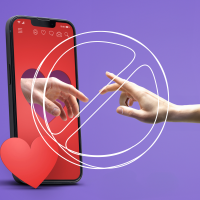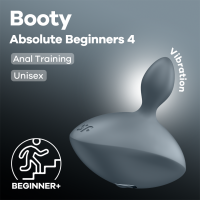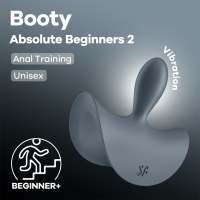All you need to know about Boysober
Why saying no to men might be exactly what didn't know you needed
When swiping through TikTok or other social media platforms, it’s hard to miss the current trend occupying the minds of Gen Z: Boysober. But what is driving this trend and why are more and more women choosing to take an intentional break from their love lives?
Why saying no to men might be exactly what didn't know you needed
When swiping through TikTok or other social media platforms, it’s hard to miss the current trend occupying the minds of Gen Z: Boysober. But what is driving this trend and why are more and more women choosing to take an intentional break from their love lives?
What does 'boysober' mean?
Going boysober is actually quite simple by following four rules: No dating apps, no dates, no exes and no hookups for a full year. Instead, staying “boysober” means abstaining from men (and sexual endeavours) and focusing on yourself. This allows women to reclaim the autonomy over their bodies, while at the same time reallocating their lost time, energy and mental space from dating into more meaningful pursuits.
Who coined the phrase “boysober”?
The phrase "boysober" was first mentioned by american comedian Hope Woodard. In early 2024 she introduced the term during her comedy routines in Brooklyn, presenting it as a playful yet empowering way to describe her choice to step back from dating and relationships with men. It wasn’t long until the concept caught on quickly on platforms like TikTok, resonating with Gen Z women seeking a reprieve from societal pressures surrounding dating and relationships.
Woodard herself explained the term “boysober” as a way to “figure out how to find purpose in life outside of who I’m dating.”
Boysober vs Celibacy: The Difference
Yes, “boysober” means staying celibate. But unlike the religious vow, it doesn’t mean complete sexual abstinence – masturbation and self-love are absolutely allowed. Of course, it’s possible that your libido might decrease when you’re the only player in the game. But others report that their desire skyrockets through indulgent self-love sessions. Why? Because solo sex has no compromises. You don’t have to explain your sexual preferences or kinks – you just know that you like them.
For instance, if you’ve only ever had partners who spoke dismissively about anal sex, it can feel incredibly liberating to use anal toys during masturbation if that’s your thing. This brings us to another point: We’re lucky to live in a time where more and more sexual wellness innovations are hitting the market – sex without a partner is anything but boring. If you want to keep enjoying sexual pleasure while taking a break from partnered sex, why not treat yourself to a new Satisfyer?
And even if your libido does decrease during a “boysober” phase, is that really such a bad thing? After all, the trend is about shifting your mental focus away from dating and sex. Libido naturally fluctuates throughout life – this is completely normal and nothing to worry about.
What does 'boysober' mean?
Going boysober is actually quite simple by following four rules: No dating apps, no dates, no exes and no hookups for a full year. Instead, staying “boysober” means abstaining from men (and sexual endeavours) and focusing on yourself. This allows women to reclaim the autonomy over their bodies, while at the same time reallocating their lost time, energy and mental space from dating into more meaningful pursuits.
Who coined the phrase “boysober”?
The phrase "boysober" was first mentioned by american comedian Hope Woodard. In early 2024 she introduced the term during her comedy routines in Brooklyn, presenting it as a playful yet empowering way to describe her choice to step back from dating and relationships with men. It wasn’t long until the concept caught on quickly on platforms like TikTok, resonating with Gen Z women seeking a reprieve from societal pressures surrounding dating and relationships.
Woodard herself explained the term “boysober” as a way to “figure out how to find purpose in life outside of who I’m dating.”
Boysober vs Celibacy: The Difference
Yes, “boysober” means staying celibate. But unlike the religious vow, it doesn’t mean complete sexual abstinence – masturbation and self-love are absolutely allowed. Of course, it’s possible that your libido might decrease when you’re the only player in the game. But others report that their desire skyrockets through indulgent self-love sessions. Why? Because solo sex has no compromises. You don’t have to explain your sexual preferences or kinks – you just know that you like them.
For instance, if you’ve only ever had partners who spoke dismissively about anal sex, it can feel incredibly liberating to use anal toys during masturbation if that’s your thing. This brings us to another point: We’re lucky to live in a time where more and more sexual wellness innovations are hitting the market – sex without a partner is anything but boring. If you want to keep enjoying sexual pleasure while taking a break from partnered sex, why not treat yourself to a new Satisfyer?
The Benefits of Going Boysober
Many women are surprised by the impact a “boysober” lifestyle can have on various aspects of their lives. It’s often only when we completely remove romantic relationships, dating, and situationships from our lives that we realize just how much mental space these things occupy. Much of this happens subconsciously – like seeking validation and approval through dating. Most of us wouldn’t openly say, "I date because I want to feel the approval of others." Yet the truth is, it often becomes clear only after stepping away from dating how much validation we were drawing from it.
This is where personal growth can begin. You can ask yourself:
● When did I learn to tie my self-worth to the approval of men?
● How can I provide myself with the affirmation that I am a valuable person?
● How can I feel desirable without relying on sex?
This kind of introspection often leads to fascinating insights.
Beyond self-reflection, there’s also a very practical effect of going “boysober”: you have more time. And that extra time can be invested in friends and family. When dating is always prioritized over friendships, it can cause some serious cracks in the foundation of those relationships over time. A “boysober” period offers the opportunity to refocus on who truly matters in your life and who stands by you during tough times.
Additionally, the freed-up time can be used for hobbies and self-care – or even for advancing your career. The reduced "dating mental load" can actually leave you with more energy for other areas of your life. And let’s face it: not constantly checking your phone to see if that guy has texted back makes it much easier to focus. In short, other areas of life can absolutely benefit from a “boysober” lifestyle.
Can certain fears and insecurities emerge from staying celibate?
Worries and fears connected to sex can arise at any time, regardless of how experienced someone is. That’s because sex is unique with every partner, meaning you always have to adapt to new people, even with regular sexual activity. Naturally, insecurities might increase after a period of abstinence. But sex shouldn’t be a performance where you aim to impress your partner anyway.
If, after a “boysober” phase, you meet someone you feel comfortable with and your desire to have sex arises, you can address possible insecurities openly. What’s stopping you from saying: “I’d really like to be intimate with you, at the same time I haven’t had sex in a while and I’m feeling a bit insecure. Can we take it slow?” A person who can’t respect such a request doesn’t deserve to be intimate with you anyway.
Here’s the good news: Many women report that a “boysober” lifestyle has made them realize what they used to tolerate in past relationships – poor communication, toxic behaviour, or pressure during sex. Once your confidence has solidified during the boysober period, you’re less likely to accept any of that again. Knowing you’re perfectly fine without sex makes it much easier to walk away from situations that don’t meet your needs.
And even if your libido does decrease during a “boysober” phase, is that really such a bad thing? After all, the trend is about shifting your mental focus away from dating and sex. Libido naturally fluctuates throughout life – this is completely normal and nothing to worry about.
The Benefits of Going Boysober
Many women are surprised by the impact a “boysober” lifestyle can have on various aspects of their lives. It’s often only when we completely remove romantic relationships, dating, and situationships from our lives that we realize just how much mental space these things occupy. Much of this happens subconsciously – like seeking validation and approval through dating. Most of us wouldn’t openly say, "I date because I want to feel the approval of others." Yet the truth is, it often becomes clear only after stepping away from dating how much validation we were drawing from it.
This is where personal growth can begin. You can ask yourself:
● When did I learn to tie my self-worth to the approval of men?
● How can I provide myself with the affirmation that I am a valuable person?
● How can I feel desirable without relying on sex?
This kind of introspection often leads to fascinating insights.
Beyond self-reflection, there’s also a very practical effect of going “boysober”: you have more time. And that extra time can be invested in friends and family. When dating is always prioritized over friendships, it can cause some serious cracks in the foundation of those relationships over time. A “boysober” period offers the opportunity to refocus on who truly matters in your life and who stands by you during tough times.
Additionally, the freed-up time can be used for hobbies and self-care – or even for advancing your career. The reduced "dating mental load" can actually leave you with more energy for other areas of your life. And let’s face it: not constantly checking your phone to see if that guy has texted back makes it much easier to focus. In short, other areas of life can absolutely benefit from a “boysober” lifestyle.
Can certain fears and insecurities emerge from staying celibate?
Worries and fears connected to sex can arise at any time, regardless of how experienced someone is. That’s because sex is unique with every partner, meaning you always have to adapt to new people, even with regular sexual activity. Naturally, insecurities might increase after a period of abstinence. But sex shouldn’t be a performance where you aim to impress your partner anyway.
If, after a “boysober” phase, you meet someone you feel comfortable with and your desire to have sex arises, you can address possible insecurities openly. What’s stopping you from saying: “I’d really like to be intimate with you, at the same time I haven’t had sex in a while and I’m feeling a bit insecure. Can we take it slow?” A person who can’t respect such a request doesn’t deserve to be intimate with you anyway.
Here’s the good news: Many women report that a “boysober” lifestyle has made them realize what they used to tolerate in past relationships – poor communication, toxic behaviour, or pressure during sex. Once your confidence has solidified during the boysober period, you’re less likely to accept any of that again. Knowing you’re perfectly fine without sex makes it much easier to walk away from situations that don’t meet your needs.
Key takeaways: Using Celibacy to Focus on Yourself
And as mentioned before, living “boysober” doesn’t mean being completely sexually inactive. Vibrators and dildos are absolutely allowed, so you’re probably less “out of practice” than you might think.
As for the body, it doesn’t care if there’s been no penetration for a while. The vagina doesn’t loosen or become too tight. What’s much more important is whether you feel mentally ready to have sex again and whether you feel safe with your partner. If the answer is no, it’s far better to continue abstaining than to force yourself into interactions that don’t feel right.
Key takeaways: Using Celibacy to Focus on Yourself
And as mentioned before, living “boysober” doesn’t mean being completely sexually inactive. Vibrators and dildos are absolutely allowed, so you’re probably less “out of practice” than you might think.
As for the body, it doesn’t care if there’s been no penetration for a while. The vagina doesn’t loosen or become too tight. What’s much more important is whether you feel mentally ready to have sex again and whether you feel safe with your partner. If the answer is no, it’s far better to continue abstaining than to force yourself into interactions that don’t feel right.









